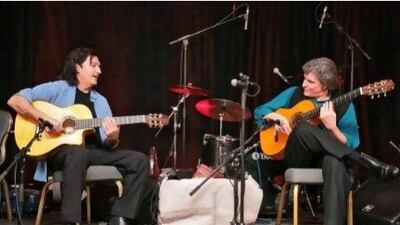There are 13,158 kilometres and 10-and-a-half time zones between San José, Costa Rica and Tehran, Iran. In at least one case, though, the distance is shortened by a common language.
For the past 33 years, the virtuoso guitarist duo of Jorge Strunz and Ardeshir Farah have spoken through fretboards. As Strunz & Farah, the duo have been at the forefront of jazz/world music with an unlikely fusion of Latin and Middle Eastern grooves, sounds and cultures.
Strunz readily agrees that the entire project "was unlikely. Our cultural backgrounds are bigger than either of us. It's a lot of baggage to bring in. And it wasn't represented anywhere else in acoustic guitar".
Yeah, get in line with all the other Latin/Iranian fusions. As the men assembled at a table in the bar of their hotel before their sixth appearance this year at the Montreal International Jazz Festival - the world's largest - they both spoke in gentle voices, with Strunz the more pointed and Farah an impossibly Zen presence.
Strunz & Farah defy boundaries, with 14 studio albums of slippery, virtuoso globe-straddling musical Esperanto, the most recent being 2011's Journey Around the Sun. They have been nominated for a Grammy and even recorded with Sting on music for the 1995 documentary The Living Sea, although Strunz, who recorded in a different studio, says: "I've never met or said two words to him."
Strunz and Farah met in the United States in 1979 when Strunz was working on a fourth album with the jazz fusion outfit Caldera. "We both wanted to do acoustic music, to get away from all that fusion," Strunz says. "It had gotten to the point where there was so much equipment, so many roadies, that I just wanted to get back to two chairs, two acoustic guitars."
A five-hour conversation at a friend's place revealed there was chemistry. They shared a similar interest in a technical approach to the instrument, an admiration for John McLaughlin and Paco de Lucia, and Strunz had a few compositions to use as a "point of departure". He also had connections to Capitol Records and other corporate links.
"Labels all thought it was too exotic: 'Great guitar playing, but where do we sell this?' I remember one guy said: 'We deal in sneakers and you guys are giving us fine Italian shoes.'"
Turns out there's a market for those. The duo self-released their debut album, Mosaico, in 1980. "At that point, what the labels wouldn't touch, radio stations had no problem with." KKGO FM, a Los Angeles jazz radio station, began spinning tracks from the album - which is interesting, because the music had no category to fit.
"The name World Music came into play in the late 1980s," Farah says. "When we recorded in 1980, that category was seven years away."
But they had taken two things and created a third. The sound streams mainly from Latin American music but features Middle Eastern percussion such as the doumbek and flows in and out of gypsy and flamenco. While both guitarists enjoy and admire that genre, they affirm they are not flamenco guitarists. Strunz cites the Nu Flamenco star Ottmar Liebert with a shiver. "To this day, there are flamenco players who can't tolerate him. So you can't use the term lightly."
Beyond the pleasures of genre (con)fusion, is there a message in all of this? "I think it's not a conscious message," says Strunz. "But it's like someone said about Jimi Hendrix: the mere fact of him playing music was a political act. Perhaps the same could somewhat be said about us. We're progressive people, but not political."
Perhaps Farah's political act was in leaving his native Iran in 1969, before he could experience the kind of fugitive musician lifestyle documented in the 2009 film No One Knows About Persian Cats. "The last time I was in Iran was two years before the revolution, in 1977, so I've never witnessed [the Islamic regime]. But I know a few bands from Iran in Los Angeles. They tell me their stories. It's very hard for them to rehearse - somebody has to be on the roof to see if the neighbours are out, because if somebody calls the authorities they break everything up."
Strunz & Farah has been invited by Iranian promoters, but official complications have prevented it.
"You've got to get permission from this government, that official. And then if you're there there's always the risk that one of the mullahs would shut you down," Strunz says.
And if anything, the duo is devoted to the freedom afforded by their instrument. "It's a very international instrument. It can express many different cultures and fusions of cultures. We're always communicating in a mutually intelligible language," says Strunz.
"Although I should work on my Spanish," Farah adds with comic timing. "I mean, my sister speaks Spanish."

